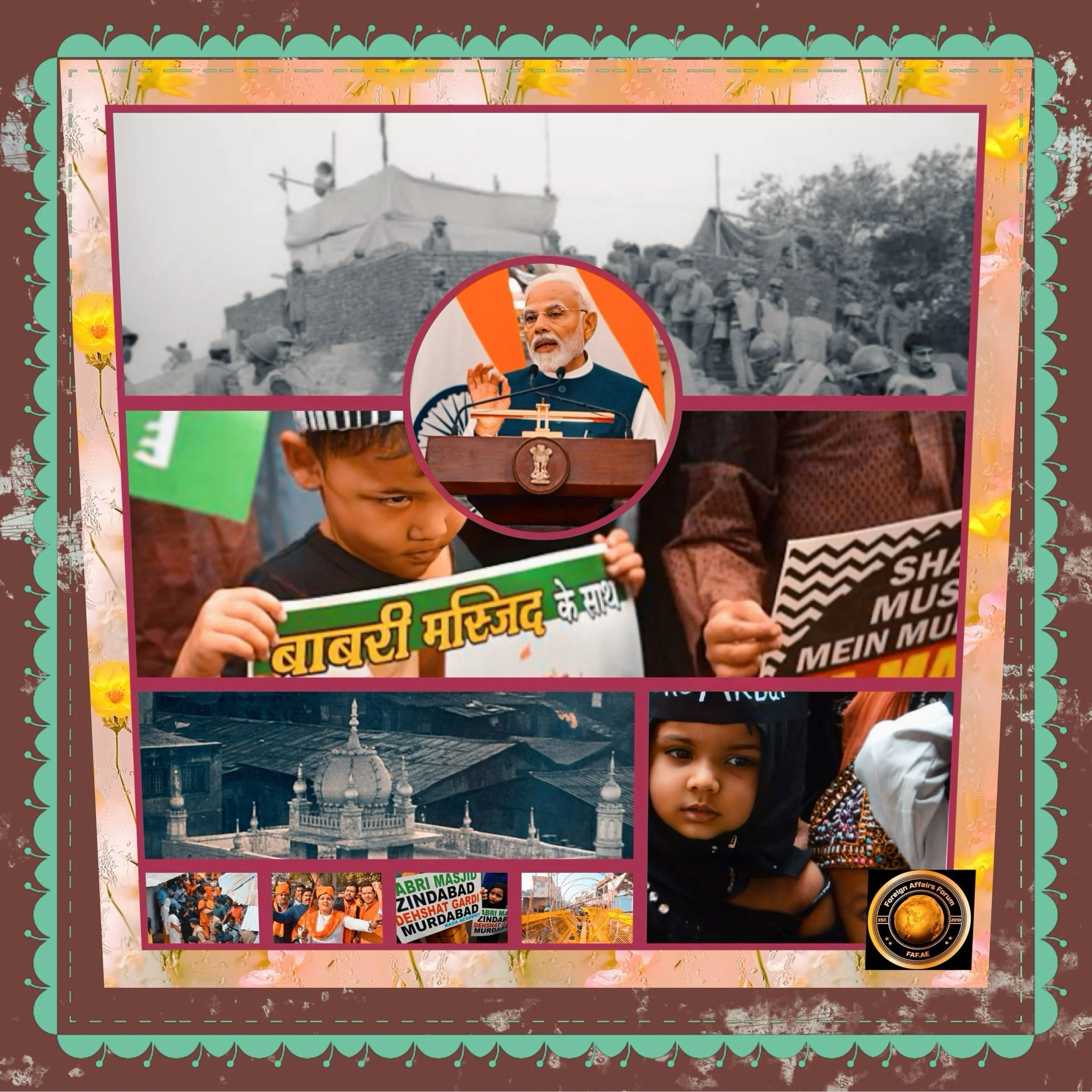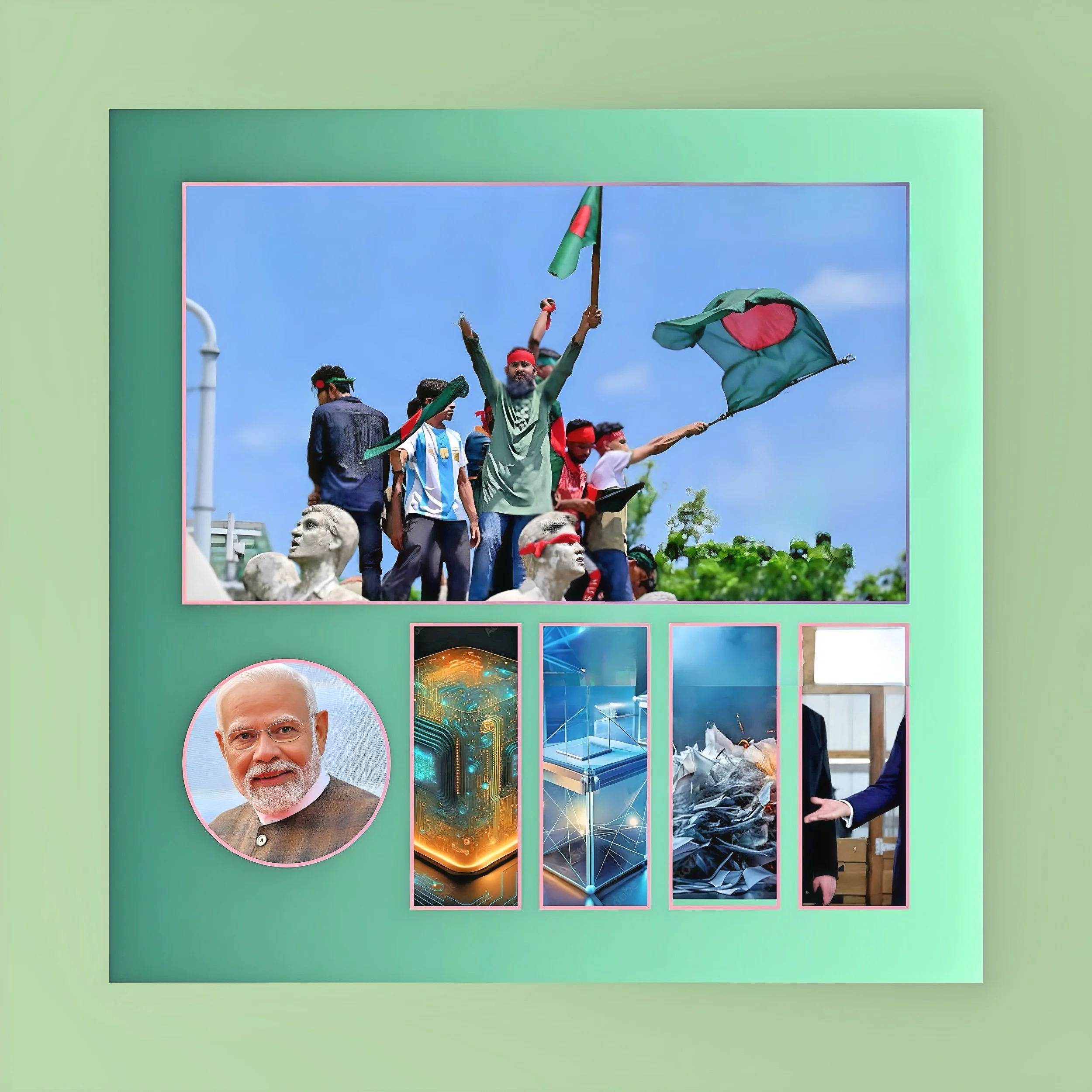Rising Concerns for Muslims in India: A Secular Nation’s Mosque Demolitions
Introduction
The ongoing demolition of historic mosques across India has raised significant concerns about the country’s constitutional commitment to secularism and the status of its Muslim minority.
Despite India’s founding as a secular democracy where all religions enjoy equal protection under the law, recent years have witnessed a troubling pattern of mosque demolitions, often justified on technical grounds but occurring within a broader context of religious tensions.
FAF examines the nature of these demolitions, their legal justifications, the response from courts, and what these developments reveal about the changing relationship between India’s secular identity and its Muslim population.
Constitutional Secularism and India’s Muslim Community
India’s constitution enshrines secularism through Articles 15, 16, 25, 26, 27, 28, and 29(2), collectively guaranteeing fundamental rights to all citizens regardless of religion.
These provisions establish what scholars have described as “relational neutrality” rather than strict religious neutrality, allowing the state to engage with religious communities while maintaining secular principles.
This constitutional framework accommodated India’s religious diversity while preventing state favoritism toward any faith.
For Muslims, who constitute approximately 200 million of India’s 1.3 billion population, these guarantees have historically provided institutional space to practice their religion with dignity and respect.
Indian secularism has increasingly become part of the minority rights discourse.
Contrary to narratives suggesting that India’s secularism stems primarily from Hindu tolerance, scholars argue that Muslims have contributed equally to the secular fabric of the nation.
Islamic organizations like Jamaat-i-Islami-Hind have actively engaged in defending the democratic and secular structure against challenges, declaring that Muslims must work toward “safeguarding human rights, promoting democratic values and containing the upsurge of fascism in the country.”
The Evolution of Secular Practice
Despite constitutional guarantees, some observers have noted contradictions between India’s secular ideals and operational reality. Critics point to a growing disconnect between the constitutional secular state and its practical implementation, particularly regarding the treatment of the Muslim community.
The concept of secularism in India has been increasingly challenged by rising Hindu nationalist sentiment.
Political commentator Ashwin Sanghi has argued that “India is secular primarily because of its Hindu ethos,” a perspective that minimizes Muslim contributions to India’s pluralistic tradition and implies that secularism exists thanks to Hindu tolerance rather than as a constitutional principle.
Recent Wave of Mosque Demolitions
Recent years have witnessed a disturbing pattern of mosque demolitions across India, with authorities typically citing “illegal encroachment” or development necessities as justification.
These demolitions have affected historic structures dating back centuries.
High-Profile Demolition Cases
In January 2024, the Delhi Development Authority (DDA) bulldozed a 600-year-old mosque in Delhi’s Mehrauli area, claiming it was illegally built on forest land.
The demolition also destroyed an adjoining madrassa (religious school) that housed 26 students, primarily orphans, a graveyard, and a Sufi shrine.
In February 2025, authorities in Uttar Pradesh partially demolished the Madni Mosque in Kushinagar district, alleging illegal occupation and construction.
The demolition, which used seven JCBs and two Pokland machines, caused significant structural damage, leaving cracks in all walls of the surviving structure.
In January 2025, authorities in Ujjain, Madhya Pradesh, bulldozed the historic Takiya Mosque and nearly 250 other properties in Ujjain to clear land for the $1 billion Mahakal Corridor project surrounding a Hindu temple.
The land belonged to the Madhya Pradesh Waqf Board, which manages properties donated by Muslims for religious or charitable purposes.
In December 2024, authorities in Uttar Pradesh’s Fatehpur district demolished part of the 185-year-old Noori Mosque, built in 1839, citing “encroachment” on a road that was constructed in 1956.
While mosque committee members claimed the structure predated the road by over a century, officials insisted that the demolished portion had been built only three years prior.
Pattern of Demolitions
These demolitions follow a pattern: authorities cite technical violations or development needs, often act swiftly with limited notice, and frequently proceed despite pending legal challenges or mosque committees’ claims of proper documentation.
The twin demolitions in Uttarakhand state and Delhi in early 2024 came just weeks after Prime Minister Narendra Modi inaugurated the controversial Ram Mandir, a temple built on the foundations of the demolished Babri Masjid.
Critics have characterized these demolitions as part of a broader effort to reshape India’s religious landscape.
As one observer noted, “The rule of Prime Minister Narendra Modi’s Bharatiya Janata Party (BJP) is increasingly marked by a destructive urgency… progressed to new strategies such as bulldozing Muslim monuments”.
Legal Challenges and Judicial Intervention
The demolitions have sparked significant legal battles, with courts increasingly intervening to address perceived due process violations.
Supreme Court Guidelines
In November 2024, the Supreme Court established pan-India guidelines barring the demolition of properties without prior show cause notice and at least 15 days for the aggrieved party to respond.
These guidelines aimed to ensure due process in demolition actions nationwide.
The guidelines specified that “no demolition should be carried out without a prior show cause notice returnable either by the time provided by the local municipal laws or within 15 days from the date of service of such notice, whichever is later”.
The court clarified that these protections would not apply to unauthorized structures in public spaces or cases where courts had specifically ordered demolition.
Contempt Proceedings and Judicial Oversight
In February 2025, the Supreme Court issued a contempt notice to officials in Uttar Pradesh for razing a portion of the Madni Mosque in Kushinagar district in alleged disobedience of these guidelines.
The court restrained authorities from further demolition and questioned why contempt proceedings should not be initiated.
Senior Advocate Huzefa Ahmadi, representing the petitioners, argued that the structure was constructed on private land owned by the petitioners with due sanction from municipal authorities per a 1999 order.
He noted that a sub-divisional magistrate had investigated and reported that the structure complied with the sanctioned plan but was subsequently transferred before demolition.
Similarly, the Bombay High Court has directed the Thane Municipal Corporation to demolish an unauthorized mosque by April 14, 2025, after the end of Ramzan, emphasizing the need for consistent application of the law.
The court expressed displeasure over delays in enforcement, noting that officials appeared to shield illegal constructions.
Political Context: Hindu Nationalism and Secular Challenges
The mosque demolitions are occurring against a backdrop of rising Hindu nationalism and challenges to India’s secular identity.
The Babri Masjid Precedent
The 1992 demolition of the Babri Masjid by Hindu mobs represented a watershed moment in India’s religious politics.
In September 2020, a court acquitted 32 people, including senior BJP leaders, of charges related to the mosque’s destruction, ruling there was insufficient evidence to prove a planned conspiracy.
The demolition triggered violence that killed approximately 2,000 people and marked a pivotal moment in the rise of Hindu nationalist politics.
In November 2019, India’s Supreme Court awarded the disputed site to Hindus, allowing the construction of a Ram temple while allocating an alternative plot for Muslims to build a mosque.
Prime Minister Modi inaugurated the temple in early 2024, described as “a seismic shift away from modern India’s secular founding principles.”
Rising Religious Polarization
The ongoing mosque demolitions have heightened concerns about religious polarization.
The twin demolitions in Uttarakhand and Delhi that occurred shortly after the Ram Mandir inauguration were seen as part of a pattern of assertive Hindu nationalism.
In Haldwani, Uttarakhand, the demolition of a mosque and madrassa led to deadly clashes that killed at least six people.
Critics argue these developments represent the erosion of India’s secular foundations.
Political observers note that under Modi’s leadership, whose Bharatiya Janata Party (BJP) has roots in the Hindu nationalist organization Rashtriya Swayamsevak Sangh (RSS), there has been “a rise in suspected hate crimes against Muslims.”
Impact on India’s Muslim Community
The demolitions and broader political trends have generated significant concern within India’s Muslim community about their status as equal citizens in a secular democracy.
Concerns of Marginalization
Some observers have characterized the current situation as one of “increasing exclusion, marginalization and discrimination of the community at all levels — social, political, economic and cultural, reducing the community to second class citizens.”
The demolition of historic mosques has particularly alarmed Muslims, who see these actions as threatening their religious and cultural heritage.
In Haldwani, where deadly violence erupted following the demolition of a mosque and madrassa, scared Muslim families expressed a desire to leave the area entirely.
According to the 2011 census, about one-third of Haldwani’s 220,000 people are Muslims.
Waqf Properties and Proposed Legislative Changes
The ongoing demolitions have highlighted vulnerabilities in India’s Waqf system, which manages properties donated by Muslims for religious or charitable purposes.
With over 872,000 properties spanning nearly 405,000 hectares valued at approximately $14.22 billion, Waqf boards are India’s most prominent urban landowners and third-largest overall landholders after the army and railways.
The Modi cabinet’s proposed Waqf (Amendment) Bill has raised additional concerns.
The bill would make 14 amendments to existing law, including appointing non-Muslims as Waqf board members and requiring mandatory registration of Waqf properties with district administrations.
Like opposition parliamentarian Sanjay Singh, critics have characterized the bill as “the beginning of capturing the land of mosques and dargahs.”
Legal expert G. Mohan Gopal described the bill as “a violation of minority rights” and “part of the overall strategy to weaken the Muslim community and enhance Islamophobia.”
He highlighted the “singling out” of Waqf properties when other religions’ right to community autonomy remains untouched, noting that “Devaswom Boards, which oversee the secular governance of public temples in Kerala, can statutorily have only Hindus as members.”
Conclusion
Challenges to India’s Secular Future
The ongoing demolition of mosques across India raises profound questions about the country’s commitment to secularism and religious pluralism.
While authorities typically cite technical violations or development necessities for these actions, the pattern of demolitions—often executed swiftly and sometimes in apparent violation of legal protections—has generated significant concern about the targeting of Muslim religious sites.
The Supreme Court’s intervention through nationwide demolition guidelines represents a crucial judicial check, but the continuing incidents suggest deeper tensions between India’s constitutional secular identity and its current political reality.
For India’s Muslim community, these developments have heightened anxieties about their place in a nation constitutionally committed to equal treatment regardless of faith.
As India approaches primary national elections, the treatment of religious minorities and the protection of their places of worship will remain a crucial test of the country’s democratic and secular credentials.
Resolving these tensions will significantly shape India’s future as a pluralistic democracy where citizens of all faiths can practice their religions freely and with dignity.





